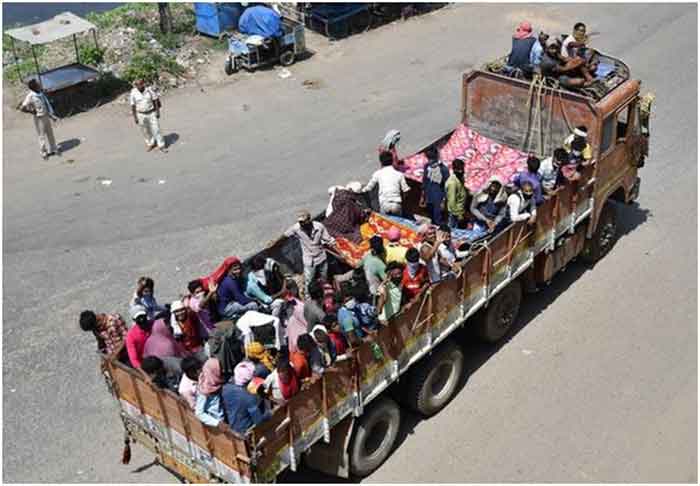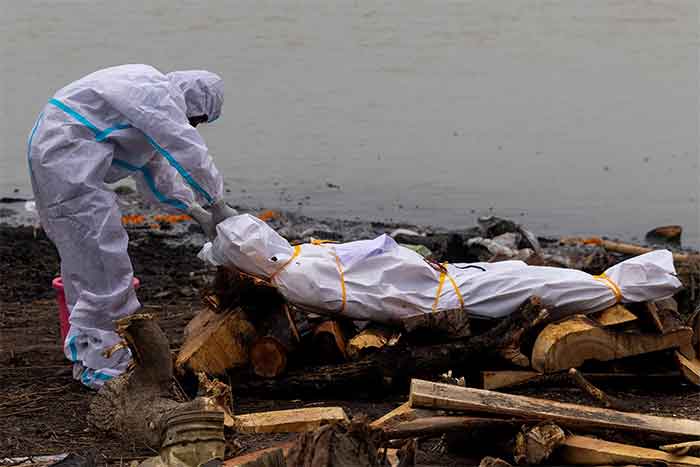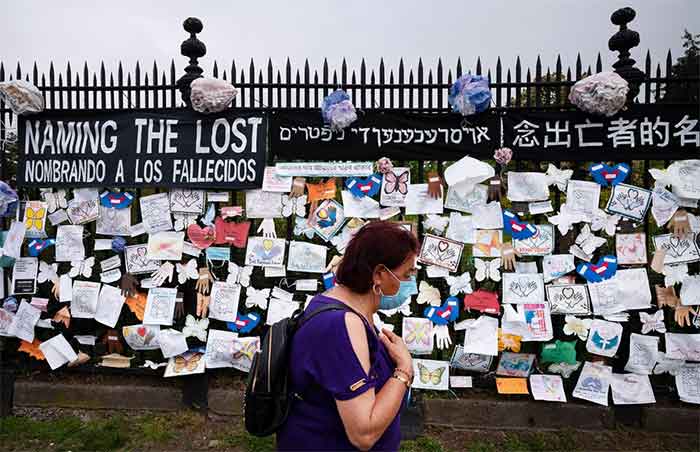After the pandemic, a rethink on the way our society is can be undertaken but currently the focus has to be on survival.
Reproduced below, in summary, the salient points Kumar makes which should be Must Reading for policymakers: In India, the human cost of a misadventure will be enormous.

Migrant workers travelling in a truck in Patna, to get to their hometowns. Photograph used for representational purposes only | Photo Credit: Ranjeet Kumar (May 16, The Hindu)
- It was speculated initially that heat would kill it but its continued spread in India in April and earlier spread in tropical climates does not give much hope. As yet, there is no medicine or a vaccine against the disease.
- We should not be caught unawares a second time. This time we got caught not knowing how to cope with the acute crisis we confront. There is the “Precautionary Principle” which says assume that the worst can happen and plan for it.
- Survival is more important than any temporary gains that can be made in case luckily the intensity of the disease declines.
- A lockdown slows down the rapid spread of the disease and thereby prevents the medical system from getting overwhelmed. The Indian medical system is woefully inadequate with shortages of doctors, nurses, hospitals and equipment.
- The medical infrastructure in New York City, UK, Italy and Spain got overwhelmed quickly even though it is far better than the Indian system. It is clear that a lockdown does not kill the virus but buys time to cope with the spread. It also buys time till the vaccine or the medicine against the virus can be found.
- Given the deficiencies of the Indian medical system, widespread poverty and malnourishment, India needs a longish period of lockdown.
- Because of a lack of adequate testing facilities, we cannot even tell whether the disease is spreading or controlled. If some districts are not reporting any cases, we cannot be sure whether it is because of inadequate testing or because genuinely there are no cases.
- A premature opening up without having adequate testing is a sure shot invitation for another spread and another lockdown which would be even more painful. The disease could spread rapidly and overwhelm the very poor health system and lead to social chaos.
- There is an alternative view that due to the lockdown, the poor have lost employment and incomes, and they will die of hunger. It is also said that if a large number of people get infected and there is “herd immunity”, as happens with other viruses, the population will develop resistance/immunity to the virus. Further, it is argued that 80 percent of people have a mild form of the disease and they get cured automatically. These are the asymptomatic cases. Out of the remaining, 15 percent will have medium level symptoms and would need isolation.
- But five percent will require hospitalisation and two percent would need ventilators and may die. This policy did not work in the UK and they had to reverse the policy in days as the cases shot up and their huge public health system got overloaded. They are on the way to having the largest number of deaths in Europe.
In India, the human cost of a misadventure will be enormous.
If the disease spreads to only 60 percent of the population in the first round, it will mean 82 crore Indians.
If 20 percent require isolation and hospitalisation, it will mean 27 crore beds. If five percent need ventilators, it will mean about seven crore people and we have only about a lakh of them.
So, most would die and their numbers may be upward of five crore in a year. Can society survive such a catastrophe? That is why we need to have an extended lockdown.
It is a consequence of our indifference to our huge poverty and neglect of public health infrastructure since independence.
How to make the lockdown work?
Making the lockdown work in India is a challenge. The poor do not have the resilience to deal with such a crisis. They live in poverty, earning and buying their necessities daily. They cannot stock up essentials like the middle classes and the rich. They also live in crowded places, at times five or more people to a room so that isolation is difficult.
- The poor have to be supplied essentials where they live. Food godowns are overflowing, so food can be distributed to the poor. If this is not done, people will rush around and there may be food riots and the lockdown would fail.
- There should be free tests—they cannot afford Rs 4,500 per test. They also need to be decongested from their slums. For this, schools and halls can be used and tents set up in open grounds. Those wanting to go back to their villages should be enabled to do so after testing.
- Farmers face the problem of marketing of crops and prices are falling. Reports are coming of fruits and vegetables rotting in the fields. The State should procure all the crops and use the excess to supply urban pockets where there are shortages. Public transport—buses and trucks—that are lying idle can be used for the purpose. This extended procurement and enhanced public distribution at the doorstep would solve the problem of both the farmers and the poor in urban areas and enable the success of the lockdown.
- Health infrastructure should be rapidly expanded. Production of equipment and protective gear need to be ramped up in selected factories. Hotels and hostels can be used to create isolation wards. Medical and nursing students can be given paramedic training and used to help in isolation wards and hospitals.
Resources needed for survival package
During lockdown, production is less than 25 percent of what it was earlier, in January 2020. Thus, the rate of growth of the economy is 75 percent. If it recovers back to the pre-pandemic level in six months (optimistic guess), the growth rate of the economy would be -17 percent.
If the economy is in lockdown for two months and then it immediately recovers to the pre-pandemic level, an impossibility, the rate of growth would be -9 percent. How the IMF is expecting the rate of growth to be 1.9 percent is beyond comprehension.
- Such a big decline in the economy will lead to a sharp drop in government revenue. There will be no scope for tax cuts for businesses or giving them a stimulus. Prevention of business failures and collapse of the financial sector, which will be in big trouble, will be needed. Even funding essential expenditures like interest payment and defence will be difficult. Cuts in salaries, etc., would be needed to fund a survival package to take care of the poor, medical expenses and essential administration.
- If half the population which has lost work and has become poor is to be given essentials for six months and if this costs half the World Bank extreme poverty line of $1.9, Rs 15 lakh crore would be required. Add to this expenditure on health infrastructure, etc. The budget would not have so much resource unless other expenditures are drastically curtailed.
Professor Kumar concludes: out of box thinking needed
“India faces an unprecedented crisis and that requires out of box thinking. According to experts, without a lockdown, the situation will spin out of control. But then the economy will stall and the resource position will deteriorate. However, life has to be protected so the lockdown has to be made to work and that requires that we spend only on the most essential—a survival package to protect life and businesses. After the pandemic, a rethink on the way our society is can be undertaken but currently the focus has to be on survival.”
Source : India Legal , May 11, that published this summary of an
Article Originally published in Hindi in Outlook Hindi magazine on May 1.
Reproduced with modified title
https://www.indialegallive.com/top-news-of-the-day/covid-beyond-puditry-98817
Dr. Arun Kumar ([email protected]) is the Malcolm Adiseshiah Chair Professor at the Institute of Social Sciences, New Delhi. And Retd. Prof. of Economics, JNU.
He is the author of two recent books :
Indian Economy since Independence: Persisting Colonial Disruption.( Vision Books.)
Understanding the Black Economy and Black Money in India: An Enquiry into Causes, Consequences and Remedies.
SIGN UP FOR COUNTERCURRENTS DAILY NEWS LETTER
















































